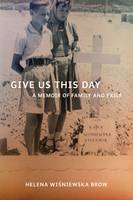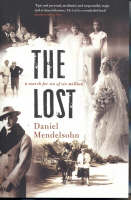One reason I think family history is so important is how strongly it can connect us with recent events. It's quite a human way of making history personal; somehow it's easier (and perhaps a little narcissistically so) to feel a connection to something, a war, a diaspora, if that's part of the story of where you came from.
 Family Matters was a sold out session at the Auckland Writers Festival that welcomed the audience into a troubled past, made so real, and so close, by two incredible authors and the stories of their families' survival.
Family Matters was a sold out session at the Auckland Writers Festival that welcomed the audience into a troubled past, made so real, and so close, by two incredible authors and the stories of their families' survival.
Helena Wiśniewska Brow is the daughter of one of the Polish evacuees who came to New Zealand in 1944, and her book Give Us This Day: A Memoir of Family and Exile tells her father's story alongside her own as she tries to find meaning from this exile.
Daniel Mendelsohn has won international awards for his book with this chilling title of The Lost: A Search for Six of Six Million, which tells Daniel's story of uncovering the true story of the six family members that were lost during the Holocaust. While he was growing up, his older family members did not talk much about their lost relatives, and over the years his curiosity grew stronger and stronger about this 'submerged continent' of his own family mystery.
The two books run parallel to each other, though the stories of their families during the Second World War are very different.
 Daniel spoke of the danger that true events get buried under statistics and clichés as time passes. The horrors of the Holocaust are difficult to comprehend, but to try and understand them by looking only at the numbers is wrong. To understand, Daniel wanted to find the true, specific stories of both the victims and the survivors.
Daniel spoke of the danger that true events get buried under statistics and clichés as time passes. The horrors of the Holocaust are difficult to comprehend, but to try and understand them by looking only at the numbers is wrong. To understand, Daniel wanted to find the true, specific stories of both the victims and the survivors.
"We have an ethical duty to restore to these people their own specificity."
Daniel feels allergic to symbols, because "no one is symbolisable." So many people died in so many different ways; the stories of one concentration camp cannot represent them all. He felt it was vitally important not to let these stories slip away, and as he interviewed the twelve surviving members of the town his family came from, he felt the pieces of his family's puzzle begin to fall into place, and the lost members seemed to reanimate.
"Stories. There isn't enough paper in the world to tell our stories."
Food was such a vital part of many of these stories. Food is culture, culture is food. Helena told of her father's escape from Poland, through forced labour in Siberia to refugee camps in Iran and finally to Wellington. Starvation was always present. By the time they reached Iran they had some food, and in New Zealand they were getting three meals a day, but starvation had rewired their brains, and the kids still hoarded bread under their beds, and raided food from nearby farms.
One survivor made Daniel wait an hour and a half in the middle of her interview while she cooked him a traditional dish:
"No one will ever cook this kind of food after I'm dead."
At the end of the session there was some time for questions. One audience member asked the authors to describe the places and the cultures their families had come from before the war. "We were the first multiculturals," Daniel said, telling us that his grandfather spoke seven languages, but this wasn't unusual as there was such a vibrant, diverse cultural richness before the war.
After a long moment of thought, Helena summed it up in one simple, devastating sentence:
"For my father it was paradise, and now it's gone."
- Search our catalogue for Helena Wiśniewska Brow and Daniel Mendelsohn.
- See our page on the Auckland Writers Festival.
- See our blog posts about the Auckland Writers Festival.



Add a comment to: Family Matters at the Auckland Writers Festival